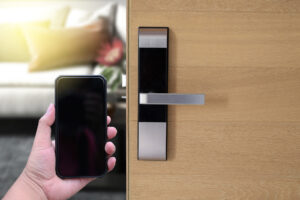
The hospitality industry is in the midst of an evolution, adapting to a rapidly changing customer that demands flexibility, convenience and mobility. As hotel marketers it’s essential to stay on top of trends and understand how advances in technology have disrupted the traditional travel bookings process.
In this blog post we’ll explore ways your business can accommodate guests with mobile-enabled services, allowing you to tap into new markets and drive increased profitability. From keyless entry systems that are controllable through smartphones to leveraging geolocation data for personalised messaging campaigns, find out what strategies you need to consider in order to create a competitive advantage and stand out from the crowd.
For centuries, the hospitality industry has been operating with a set of traditional systems and approaches. But now customer demands are shifting to meet their own mobile preferences – it’s time for the hospitality business world to jump on board! We’ll provide an oveSteps To Takerview of how our ever-changing times have led us into uncharted territory as mobility continues revolutionizing all that revolves around hotels and restaurants.Let’s take a look at what updates industries should be making in order to catch up with modern trends!
Steps To Take
The first step in the evolution of hospitality is the move from legacy systems to cloud-based solutions. Cloud technology has enabled businesses to quickly and easily access data, manage customer relationships, and automate processes. This shift has made it easier for hospitality providers to improve their service while reducing costs.
The next step in this evolution is the rise of mobile technology. Mobile devices are becoming ubiquitous, and customers expect to be able to access information and services on the go. This has led to the development of mobile-friendly websites and apps, as well as a focus on improving customer experience through features such as loyalty programs and personalized recommendations.
Finally, voice technology is beginning to emerge in the hospitality industry. Voice-based systems are being used to automate mundane tasks such as reservations, and they also allow customers to quickly access the information they need while on the go. Additionally, voice technology can provide a more personalized experience by allowing customers to give specific instructions and receive tailored responses.
Must Keep Up
As mobility continues to shape the hospitality industry, businesses must keep up with the latest trends to stay competitive. By embracing the evolution of hospitality, businesses can offer their customers a more personal and convenient experience — and ultimately increase customer loyalty and satisfaction.
The hotel industry has come a long way in terms of technology. From the early days of manual reservation systems to the current state of mobile and cloud-based technologies, the evolution of hotel technology has greatly impacted the way hotels operate and how they serve their guests. In this article, we will explore the journey of hotel technology from legacy systems to mobility.
VoIP Connectivity Phone System
Voice over Internet Protocol (VoIP) connectivity phone systems are becoming increasingly popular in today’s business environment. With their high level of reliability and cost savings, they offer a great solution for businesses of all sizes. The advantages of VoIP connectivity phone systems, and why they are becoming the go-to phone system for many businesses.
VoIP Internal calls can be a valuable tool to improve communication, collaboration, and efficiency in the workplace. By connecting employees from different departments, internal calls can help to foster better relationships, facilitate better decision-making, and allow for more effective problem-solving. Internal calls are phone calls that take place within an organization.
Legacy System
Legacy systems, also known as “on-premises” systems, were the norm in the hotel industry for many years. These systems were installed and operated on the hotel’s own servers and required a significant investment in both hardware and software. These systems were often difficult to use and required a dedicated IT staff to maintain them. They also had limited capabilities and were not able to easily integrate with other systems.
One of the biggest challenges with legacy systems was the lack of real-time data. Information was often entered manually and was not always up-to-date. This made it difficult for hotels to make informed decisions and to provide accurate information to guests. Additionally, these systems were not able to easily share information with other departments, such as housekeeping or maintenance.
With the advent of the internet and the growing importance of online booking, hotels began to adopt web-based systems. These systems were often referred to as “cloud-based” because they were hosted on remote servers and accessed through the internet. This allowed hotels to access their systems from anywhere, which greatly improved the efficiency of their operations.
Integrate Web-Based System
Web-based systems also allowed hotels to offer online booking and to integrate with third-party booking sites, such as Expedia or Booking.com. This greatly expanded the reach of hotels and allowed them to reach a global audience. Additionally, these systems allowed hotels to easily share information with other departments and to provide real-time data to guests.
The next step in the evolution of hotel technology was the introduction of mobile technologies. With the widespread use of smartphones and tablets, hotels were able to provide mobile applications for guests to book rooms, check in, and access hotel services. These applications also allowed guests to access information about the hotel, such as maps and local attractions, and to make special requests, such as room upgrades or late check-outs.
Mobility also allowed hotels to improve their operations by providing staff with mobile devices, such as tablets, that could be used to access guest information and to update reservations in real time. This greatly improved the efficiency of the front desk and housekeeping operations and allowed hotels to provide a more personalized service to guests.
Data Analytics
The current state of hotel technology is the integration of all these systems and the use of data analytics to improve the guest experience and to make better business decisions. With the use of data analytics, hotels are able to gain insights into guest behavior and preferences, which allows them to tailor their services and offer personalized promotions. Additionally, this data can be used to improve hotel operations, such as by identifying areas where there are bottlenecks or inefficiencies.
Conclusion
In conclusion, the evolution of hotel technology has greatly impacted the way hotels operate and how they serve their guests. From the early days of legacy systems to the current state of mobile and cloud-based technologies, hotels have been able to improve their operations and provide a better experience for guests. The future of hotel technology will likely continue to focus on data analytics and the integration of systems to provide an even more personalized and efficient experience for guests.
Learn more about PhoneSuite hospitality products and services that can transform your business. Get in touch today.



